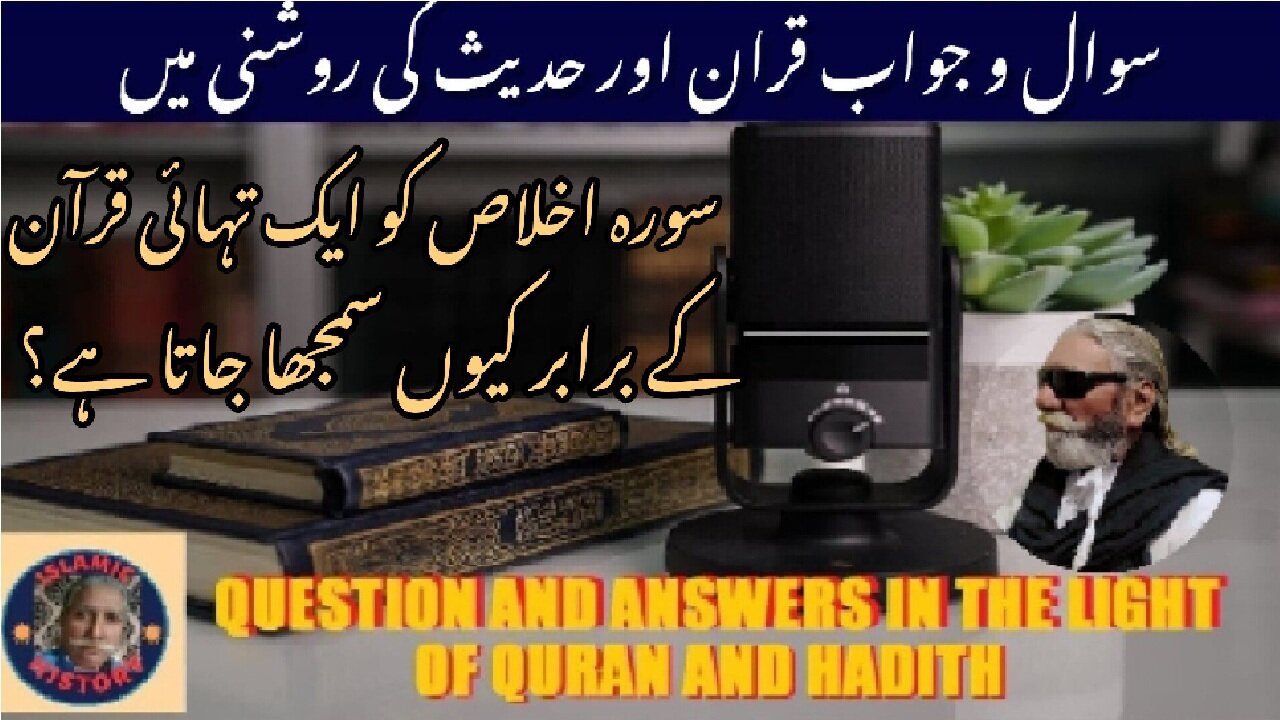Premium Only Content

Why Qul Huwallahu Ahad (Surah Ikhlas) is equivalent to one-third of the Quran?
@islamichistory813 #QulHuwallahuAhad #OneThirdOfTheQuran #IslamicEducation #QuranWisdom #SurahAlIkhlas
Why Qul Huwallahu Ahad is equivalent to one-third of the Quran
Asslamoalaikum sisters brothers friends and elders, Ever wonder you why "Qul Huwallahu Ahad" (Surah Al-Ikhlas) is considered equivalent to one-third of the Quran? In this enlightening video, we explore the profound significance of this short yet powerful Surah. We'll discuss its unique attributes, spiritual depth, and why it holds such a monumental place in Islamic teachings. Perfect for anyone looking to deepen their understanding of Quranic wisdom. Don't miss out on this educational journey that enriches your knowledge and spirituality.
Hadiths about Qul Huwallahu Ahad being one-third of the Quran
There follow some of the ahadith narrated from the Prophet (peace and blessings of Allah be upon him) which state that Surat al-Ikhlas (Qul Huwa Allahu Ahad) is equivalent to one-third of the Quran.
Al-Bukhari (6643) narrated from Abu Sa’id that a man heard another man reciting Qul Huwallahu Ahad and repeating it. The next morning he came to the Messenger of Allah (peace and blessings of Allah be upon him) and told him about that. The man thought that it was too little, but the Messenger of Allah (peace and blessings of Allah be upon him) said: “By the One in Whose Hand is my soul, it is equivalent to one-third of the Quran.”
Muslim (811) narrated from Abu’l-Darda that the Prophet (peace and blessings of Allah be upon him) said: “Is any one of you unable to recite one-third of the Quran in one night?” They said, “How could anyone read one-third of the Quran?” He said, “Qul Huwallahu Ahad is equivalent to one-third of the Quran.”
Muslim (812) narrated that Abu Hurayrah said: The Messenger of Allah (peace and blessings of Allah be upon him) said: “Gather together, for I will recite to you one-third of the Quran.” So those who could gather together gathered there, then the Prophet of Allah (peace and blessings of Allah be upon him) came out and recited Qul Huwa Allahu Ahad, then he went in. They said to one another, perhaps there has been some news from heaven on account of which he has gone inside (the house). Then the Prophet of Allah (peace and blessings of Allah be upon him) came out and said, “I told you that I was going to recite to you one-third of the Quran. Verily it is equivalent to one-third of the Quran.”
The bounty of Allah is immense
The bounty of Allah is immense, and Allah has bestowed His bounty upon this ummah and has made up for its short life span by giving it more reward for simple deeds. It is strange that with some people, instead of this motivating them to do more good, this makes them apathetic and lazy in doing acts of worship, or they feel that this bounty and reward is strange and farfetched.
How Qul Huwallahu Ahad is equivalent to one-third of the Quran
There is a difference between jaza (reward) and ijza (what is sufficient). What is making the brother confused is that he does not see the difference between them.
Jaza means the reward which Allah gives for obeying Him.
Ijza means what is sufficient and takes the place of something else.
Reciting Qul Huwallahu Ahad brings a reward equivalent to reciting one-third of the Quran, but it does not take the place of reading one-third of the Quran.
If a person vows – for example – to read one-third of the Quran, it is not sufficient for him to read Qul Huwallahu Ahad, because it is equivalent to one-third of the Quran in reward, but not in terms of being sufficient or taking the place of reading one-third of the Quran.
The same may be said of reciting it three times. If a person recites it three times in his prayer, that does not mean that he does not have to recite al-Fatihah, even though he will be given the reward of reciting the whole Quran.
A similar example is the reward given by the Lawgiver to one who offers a single prayer in the Sanctuary of Makkah, and that he will have the reward of one hundred thousand prayers. Does anyone take this divine bounty to mean that he does not have to pray for decades because he offered a single prayer in the Haram that is equivalent to one hundred thousand prayers?
Rather this has to do with reward; as for what is sufficient, that is another matter altogether.
Moreover, none of the scholars has ever said that there is no need for us to read the Quran or that Qul Huwallah Ahad is sufficient and takes the place of that.
Why Qul Huwallahu Ahad is equivalent to one-third of the Quran
The correct scholarly view is that this surah has this great virtue because the Quran deals with three topics: one-third for rulings, one-third for promises and warnings, and one-third for the Divine names and attributes.
This surah combines names and attributes.
This is the view of Abu’l-‘Abbas ibn Surayj, and Shaykh al-Islam Ibn Taymiyah stated that it was good in Majmu’ al-Fatawa, 17/103.
The Muslim cannot do without the two other issues, which are the rulings and the promises and warnings. His knowledge cannot be complete unless he looks at the Book of Allah as a whole. The one who stops at Surat al-Ikhlas cannot know the other two matters.
Shaykh al-Islam (Ibn Taymiyah – may Allah have mercy on him) said:
"Rewards are of different types, just as wealth is of different types, such as food, drink, clothing, houses, money and so on. If a man possesses one type of wealth, to the value of one thousand dinars, that does not mean that he can do without the other types. Rather if he has wealth in the form of food, he also needs clothing and a place to live, etc. Similarly if it is a type other than money, he still needs other things. If he has nothing but money, he will need all kinds of wealth that are usually needed. In al-Fatihah there are the benefits of praise and du’a which people need, and Qul Huwa Allahu Ahad cannot replace it in that sense. Although its reward is very great, he cannot benefit from it unless he also recites the Opening of the Book (al-Fatihah) in his prayer. Hence if a person recites only Qul Huwa Allahu Ahad in his prayer, without al-Fatihah, his prayer is not valid. Even if he recited the whole of the Quran without al-Fatihah, his prayer would not be valid, because al-Faatihah refers to the basic needs that people cannot do without.” (Majmu’ al-Fatawa, 17/131)
Allah hafiz
================================================
-
 12:25
12:25
ISLAMIC HISTORY
1 day agoIslamic History Episode 203 Amin bin Haroon al -Rashid अमीन बिन हारून अल -रशिद امین بن ہارون الرشید
1 -
 LIVE
LIVE
sophiesnazz
1 hour agoLETS TALK ABOUT BO7 !socials !specs
45 watching -
 LIVE
LIVE
MadHouseRetro
1 hour agoPUFFCO PIVIOT BUNDLE GIVEAWAY! and Spider-man 2 playthough!
81 watching -
 1:12:40
1:12:40
Wendy Bell Radio
11 hours agoPet Talk With The Pet Doc
54.2K30 -
 LIVE
LIVE
Biscotti-B23
49 minutes ago🔴 LIVE TOURNAMENT PRACTICE ⚔ TOP 100 RANK 👑 DEMON SLAYER HINOKAMI CHRONICLES 2
27 watching -
 LIVE
LIVE
FusedAegisTV
16 hours agoStreet Fighter 6 FINALS, CS2 Semifinals | $1,250,000 | Riyadh, Saudi Arabia EWC 2025 !estv
140 watching -
 40:42
40:42
SouthernbelleReacts
1 day ago $0.10 earned😂 American Pie (1999) Reaction | Iconic Teen Comedy, High School Chaos & 90s Nostalgia 🥧
33.5K4 -
 5:05:02
5:05:02
LumpyPotatoX2
6 hours agoBecome a HellDiver Today - #RumbleGaming
47.8K1 -
 4:52:02
4:52:02
Midnight In The Mountains
8 hours agoGaming w/ PER·SE·VER·ANCE | Sassy Saturday Fortnite | with the Midnights!
35.1K3 -
 6:22:35
6:22:35
shyboyking
6 hours agoThe Bots Of The Bots !!!😎
55.6K2